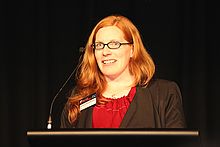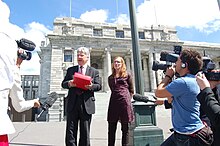Bronwyn Holloway-Smith
Bronwyn Holloway-Smith | |
|---|---|
 | |
| Born | Bronwyn Smith 1982 (age 41–42)[1] Lower Hutt[citation needed] |
| Nationality | New Zealand |
| Alma mater | Massey University |
| Website | hollowaysmith |
Bronwyn Holloway-Smith is a New Zealand artist and author from Wellington. She holds a PhD in Fine Arts from Massey University, and is co-director of Public Art Heritage Aotearoa New Zealand.
Education
[edit]Holloway-Smith graduated from Massey University with a Bachelor of Fine Arts (First Class Honours) in 2006.[citation needed] In 2014, she was awarded a scholarship to study for a PhD in Fine Art.[2] Holloway-Smith completed her PhD at the university's Toi Rauwhārangi College of Creative Arts (CoCA) in 2018.[3][4]
Career
[edit]She describes herself as interested in "internet culture, 3-dimensional printing, open source art, and space colonisation."[5] She edited the book WANTED: The search for the modernist murals of E. Mervyn Taylor, published in 2018.[6][1]
Creative Freedom Foundation
[edit]
The foundation sought to "... encourage, and promote New Zealand artists' views on issues that have the potential to influence their collective creativity." through advocacy and education.[2] It was launched, in December 2008, to oppose section 92 of the Copyright Act, due to come into force at the end of February 2009.[7] Holloway-Smith was a co-founder of Creative Freedom Foundation (CFF),[5] and served as their director and spokesperson.[2]
The Copyright Act 1994, s 92A read "Internet service provider must have policy for terminating accounts of repeat infringers".[8] CFF believed it would force Internet service providers to disconnect customers who had been accused, but not convicted, of illegally downloading copyrighted content. It was dubbed the guilt upon accusation law, and the foundation wanted it repealed.[7]
CFF called for the first New Zealand Internet Blackout to run 16–23 February 2009,[9] and organised online and paper petitions. On 19 February, Holloway-Smith led around 200 protestors at parliament.[10] She handed the petitions to Peter Dunne MP with over 10,000 virtual and 149 written signatures.[11][12] Radio New Zealand interviewed Holloway-Smith at the protest,[13] the first of many appearances over the next ten years.[14]
Section 92A never came into force and was repealed by the Copyright (Infringing File Sharing) Amendment Act 2011.[8] CFF advocated for creative freedom on that act, other domestic law and international treaties. In July 2014, Holloway-Smith stepped down from CFF to start her PhD. Lacking a successor, the trustees put the foundation into hiatus.[2]
Ghosts in the Form of Gifts (2009)
[edit]
Massey University commissioned Holloway-Smith to produce an artwork for permanent display on their Wellington campus. The university's College of Creative Arts building on Buckle Street used to belong to the National Museum of New Zealand which moved out to become Te Papa.[15][16] Holloway-Smith imagined museum pieces that might have been lost in the move.[15]
Ghosts in the Form of Gifts (2009) was a collection of ten replacement pieces produced with an open design RepRap 3D printer.[15] Three of the originals were from nature: a cicada in flight, a sperm whale tooth,[16] and a giant snail shell. The rest were man made and, with one exception, generic and of unknown origin.[15] They included a Māori matua (English: fish hook) and poi, a tapa cloth beater and an adze.[15] The exception was the Utah teapot a 3D model whose origin was well known. Holloway-Smith gifted the 3D printer instructions for the collection from her official website under the Creative Commons Attribution-ShareAlike license.[15]
In 2010, Ghosts in the Form of Gifts won the Open Source in the Arts category at the New Zealand Open Source Awards.[17] In 2012, the collection was shown at RAMP Gallery in Hamilton,[16] and reviewed by artist Peter Dornauf.[18] He wrote that everyday museum pieces had been transformed by 3D printing. The replacements "... present themselves as highly tactile yet prohibit touch because of their strange translucent ghostly nature."[16] The work also raised questions. Holloway-Smith asked "Is something a sculpture if you print it out from a machine?"[15] And Dornauf linked open sourcing the instructions to the issue of authorship.[16]
Pioneer City (2011)
[edit]In 2011, Holloway-Smith produced a series of works exploring the possibility of settling Mars. As part of this project, she won a competition to erect a billboard on Ghuznee Street, Wellington, advertising "Pioneer City" on Mars.[19] The intention behind the work was to explore how the real estate industry has aimed its marketing at people's aspirations, and how residential developments are sometimes utopian:
"We have seen this with the boom in inner-city apartment living in the past decade. We saw it in the 19th century in the way the New Zealand Company sold a romanticised picture of New Zealand to prospective settlers before they'd visited the country. My project responds to this kind of marketing in the inner city and draws attention to its timelessness".[19]
A website was also produced.[20]
Whisper Down the Lane (2012)
[edit]In 2012, the City Gallery Wellington ran The Obstinate Object: Contemporary New Zealand Sculpture exhibition 24 February–10 June.[21] Running alongside the exhibition was Whisper Down the Lane (2012) through which Holloway-Smith continued to raise awareness of copyright and produce art with 3D technologies.
Holloway-Smith picked one sculpture a week from the exhibition.[22] She discussed copyright issues with the artist then got permission to create a 3D model of the sculpture and 3D print the model as a miniature. The miniatures were sufficiently transformed from the originals that Holloway-Smith saw them as her works. She named them After ... the original artist and work in acknowledgement.[23] The miniatures were shown in the gallery's reading room and sold online.[22] Again, the 3D printer instructions were gifted under a Creative Commons license, this time Attribution-NonCommercial-ShareAlike (BY-NC-SA).[23]
Whisper Down the Lane was reviewed by art critic Mark Amery.[18] He wrote that it was "... one smart project, charged in its complexity by contemporary issues of copyright, reproduction and future changes to the art market."[22] It also won the Open Source in the Arts category at the New Zealand Open Source Awards 2012.[24]
Public Art Heritage Aotearoa New Zealand
[edit]Public Art Heritage Aotearoa New Zealand (PAHANZ) "... is a research initiative to find, document and protect [the nations's] 20th century public art heritage.", according to their website.[25] At Massey University's Toi Rauwhārangi College of Creative Arts, Holloway-Smith and Sue Elliott's research into the murals of E. Mervyn Taylor developed into an informal register of public art.[26][27] By the late 2010s, PAHANZ planned to make the register accessible through their website.[28] In the early 2020s, the initiative received $300,000 from the Ministry for Culture and Heritage's innovation fund to put the register on the web and establish a forum for those working with public art to share resources and best practice.[29][30] The national register of 20th century public art was launched on the PAHANZ website in July 2023.[26]
As of September 2024,[update] the register on the web lists 403 works. Each work has a current status for the viewing public: accessible, hidden or lost (whereabouts unknown or destroyed). The public is invited to submit further works for registration and further information about selected works whose details are incomplete.[31]
References
[edit]- ^ a b Holloway-Smith, Bronwyn, ed. (2018a). Wanted: The Search for the Modernist Murals of E. Mervyn Taylor. Auckland: Massey University Press. ISBN 9780994141552.
- ^ a b c d Holloway-Smith, Bronwyn (11 July 2014). "Holloway-Smith Steps Down As CFF Director (Open Letter)". Creative Freedom Foundation. Archived from the original on 13 August 2017. Retrieved 15 June 2024.
- ^ "Wellington Graduation Sees Four Staff Receive Doctorates". Massey University. 7 June 2019. Retrieved 15 June 2024.
- ^ Holloway-Smith, Bronwyn (2018b). The Southern Cross cable : a tour : art, the internet and national identity in Aotearoa-New Zealand. Massey Research Online (Doctoral thesis). Massey University. hdl:10179/14941. Retrieved 15 June 2024.
- ^ a b "Bronwyn Holloway-Smith". 18 July 2012. Archived from the original on 13 August 2017. Retrieved 3 November 2017.
- ^ "10 questions with Bronwyn Holloway-Smith | Massey University Press". www.masseypress.ac.nz. Retrieved 13 December 2018.
- ^ a b "CreativeFreedom.org.nz Launches with Campaign Against Guilt upon Accusation Laws in NZ". Creative Freedom Foundation (CFF). 18 December 2008. Archived from the original on 18 December 2008. Retrieved 17 June 2024.
- ^ a b "Copyright Act 1994, s 92A". New Zealand Legislation. 31 October 2008. Retrieved 17 June 2024.
- ^ "CFF Announce Internet Blackout Against Guilt upon Accusation Laws". Creative Freedom Foundation (CFF). 16 February 2009. Archived from the original on 17 February 2009. Retrieved 17 June 2024.
- ^ "Protesters Want Copyright Provision Scrapped". Radio NZ. 19 February 2009. Retrieved 16 June 2024.
- ^ McDonald, Greer (20 February 2009). "Internet Law Change 'Unjust'". The Dominion Post. Wellington. Retrieved 16 June 2024.
- ^ Holloway-Smith, Bronwyn (20 February 2009). "Petition 2008/7 of Bronwyn Holloway-Smith and 148 Others". New Zealand Parliament. Retrieved 16 June 2024.
- ^ Smith, Emma (19 February 2009). "Copyright Act Amendment Protest". Radio New Zealand. Retrieved 14 June 2024.
- ^ "Search Results: Bronwyn Holloway-Smith". Radio New Zealand. n.d. Retrieved 19 June 2024.
- ^ a b c d e f g O'Neill, Rob (27 January 2010). "3D Printer Deployed for the Cause of Art". Computerworld: New Zealand. Archived from the original on 23 September 2015. Retrieved 13 June 2024.
- ^ a b c d e Dornauf, Peter (6 May 2012). "Glancing at the History of Digital Art". EyeContact. Retrieved 13 June 2024.
- ^ "2010 Winners and Finalists". New Zealand Open Source Awards. 2010. Retrieved 13 June 2024.
- ^ a b "Writers". EyeContact. n.d. Retrieved 13 June 2024.
- ^ a b "A second public art billboard project". bartley + company art. 28 March 2011. Archived from the original on 1 September 2011. Retrieved 27 November 2014.
- ^ "Pioneer City". n.d. Archived from the original on 21 May 2011. Retrieved 14 June 2024.
- ^ "The Obstinate Object: Contemporary New Zealand Sculpture". City Gallery Wellington. n.d. Retrieved 14 July 2024.
- ^ a b c Amery, Mark (10 April 2012). "The Stubbornness of Sculpture 2". EyeContact. Retrieved 14 July 2024.
- ^ a b Freeman, Lynn (4 March 2012). "The Thorny Issue of Copyright". Arts on Sunday. Radio New Zealand. RNZ National. Retrieved 14 July 2024.
- ^ "2012 Winners and Finalists". New Zealand Open Source Awards. 2012. Retrieved 14 July 2024.
- ^ "Haere mai!". Public Art Heritage Aotearoa New Zealand. n.d. Retrieved 10 June 2024.
- ^ a b "Safeguarding 20th Century Artwork in Aotearoa from Disappearing". Afternoons. 26 July 2023. Radio New Zealand. RNZ National. Retrieved 6 June 2024.
- ^ "About". Public Art Heritage Aotearoa New Zealand. n.d. Archived from the original on 29 November 2019. Retrieved 10 June 2024.
- ^ "Public Art Register". Public Art Heritage Aotearoa New Zealand. n.d. Archived from the original on 29 November 2019. Retrieved 10 June 2024.
- ^ "Innovation Fund Recipients". Ministry for Culture and Heritage. 20 September 2023. Retrieved 7 June 2024.
- ^ "Discovering and Protecting Our Public Art". Rangahau: Research at Massey. No. 4. Wellington: Massey University. 2022. Retrieved 10 June 2024.
- ^ "Artworks". Public Art Heritage Aotearoa New Zealand. n.d. Retrieved 6 June 2024.
